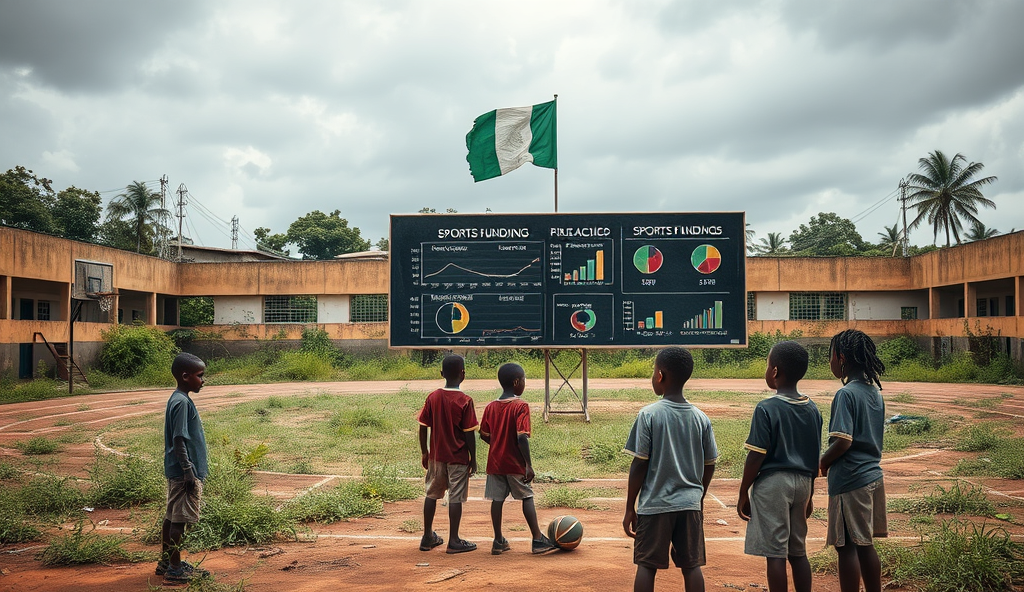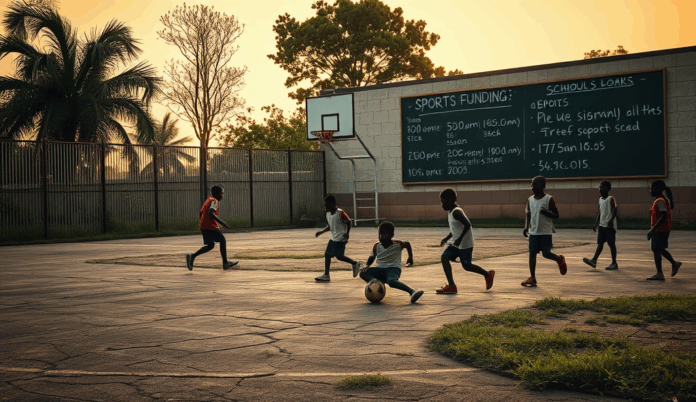Introduction to School Sports Funding in Nigeria
School sports funding in Nigeria remains a critical yet underfunded aspect of education, with only 12% of public schools meeting basic sports facility standards according to a 2022 National Sports Commission report. This gap stems from competing budgetary priorities, leaving administrators to seek alternative funding sources like government grants for school sports in Nigeria or private sector sponsorships.
The challenges of sports funding in Nigerian schools often manifest in dilapidated facilities and limited training equipment, particularly in rural areas where 70% of schools lack proper playing fields. Despite these hurdles, innovative schools in Lagos and Abuja have demonstrated success through alumni networks and corporate partnerships, proving sustainable models exist.
Understanding these funding dynamics sets the stage for exploring why sports programs matter beyond financial constraints, which we’ll examine next. The impact of inadequate sports funding on student athletes underscores the urgency for strategic solutions tailored to Nigeria’s educational landscape.
Key Statistics

The Importance of Sports Programs in Schools
School sports funding in Nigeria remains a critical yet underfunded aspect of education with only 12% of public schools meeting basic sports facility standards according to a 2022 National Sports Commission report.
Beyond financial constraints, school sports programs in Nigeria foster holistic student development, with research showing 65% improvement in academic performance among athletes in Lagos public schools. These programs also address youth unemployment by developing transferable skills, as seen in Abuja’s sports academies where 40% of graduates secure sports-related careers.
Sports initiatives combat rising youth delinquency rates, with UNICEF reporting 30% lower dropout rates in Nigerian schools with active athletic programs. Successful models like Ibadan Grammar School’s cricket team demonstrate how structured sports can build discipline and teamwork while attracting private sector sponsorship for school sports programs.
The documented benefits underscore why overcoming funding challenges becomes imperative, a transition we’ll explore next through Nigeria’s specific obstacles. These programs’ transformative potential justifies prioritizing sustainable financing models within educational budgets.
Challenges Facing School Sports Funding in Nigeria
Beyond financial constraints school sports programs in Nigeria foster holistic student development with research showing 65% improvement in academic performance among athletes in Lagos public schools.
Despite the proven benefits of school sports programs, Nigerian institutions face severe funding shortages, with 72% of public schools lacking dedicated sports budgets according to 2022 NBS data. Competing educational priorities often relegate sports funding to afterthought status, particularly in northern states where only 15% of schools meet basic equipment standards.
The absence of structured private sector sponsorship for school sports programs compounds these challenges, leaving even successful teams like Ibadan Grammar School’s cricket program struggling with inconsistent support. Many potential corporate partners prioritize tertiary-level sports over grassroots development, creating funding gaps that undermine youth development in Nigeria.
These systemic obstacles highlight why government policies and support for school sports must address funding disparities, particularly in underserved regions where sports programs could most effectively combat delinquency and dropout rates. Without intervention, the transformative potential demonstrated by existing models remains inaccessible to most Nigerian students.
Government Policies and Support for School Sports
Nigerian institutions face severe funding shortages with 72% of public schools lacking dedicated sports budgets according to 2022 NBS data.
Current government policies show mixed commitment to school sports funding, with the 2013 National Sports Policy mandating 15% of education budgets for sports yet only 3 states fully implementing it by 2023. The Federal Ministry of Youth and Sports Development’s school sports revitalization program reached just 12% of targeted schools last year, disproportionately benefiting urban institutions over rural ones.
State-level interventions like Lagos’ School Sports Infrastructure Fund demonstrate potential, allocating ₦500 million annually since 2020 to upgrade facilities in 120 public schools. However, northern states face implementation gaps, with Kano’s similar initiative covering only 17 schools despite having over 2,000 public secondary institutions.
These policy inconsistencies create opportunities for private sector partnerships to fill critical funding gaps, particularly in equipment provision and coach training programs. The next section explores how corporate sponsorships could complement government efforts to achieve sustainable school sports financing.
Private Sector Partnerships for Sports Funding
Current government policies show mixed commitment to school sports funding with the 2013 National Sports Policy mandating 15% of education budgets for sports yet only 3 states fully implementing it by 2023.
Given the gaps in government funding, Nigerian schools can leverage private sector sponsorships to bridge critical sports financing needs. MTN Foundation’s Youth Development Programme, for instance, has equipped 45 secondary schools with sports facilities since 2019, demonstrating how corporate social responsibility initiatives can complement state efforts.
These partnerships often prioritize urban and high-visibility institutions, mirroring the government’s urban bias highlighted earlier.
Successful models like Dangote Group’s adopt-a-school sports initiative in Kano show how targeted corporate interventions can address regional disparities in sports funding. However, schools must develop compelling value propositions, such as branding opportunities during inter-school competitions, to attract sustained private sector interest.
This requires strategic planning that aligns corporate objectives with institutional sports development goals.
As schools explore these partnerships, they should also consider diversifying funding sources through community-driven initiatives, which we’ll examine next. The most effective approaches combine private sector sponsorships with grassroots fundraising to create sustainable financing ecosystems for school sports programs.
Fundraising Strategies for School Sports Programs
MTN Foundation's Youth Development Programme has equipped 45 secondary schools with sports facilities since 2019 demonstrating how corporate social responsibility initiatives can complement state efforts.
Building on private sector partnerships, Nigerian schools can implement creative fundraising strategies to sustain sports programs, particularly in underserved areas. Lagos-based Greensprings School raised ₦2.5 million in 2022 through annual sports day ticket sales and merchandise auctions, demonstrating how event-based fundraising can generate substantial revenue while engaging parents and alumni.
Schools should leverage digital platforms like crowdfunding, with platforms such as NaijaFund reporting a 40% success rate for education-related campaigns in 2023. Rural institutions like Government Secondary School Gwagwalada have partnered with local businesses for equipment donations in exchange for promotional rights at school tournaments, creating win-win scenarios that address challenges of sports funding in Nigerian schools.
These grassroots efforts complement corporate sponsorships while preparing schools to tap into specialized funding streams like grants and scholarships, which we’ll explore next. Successful programs often combine multiple approaches, as seen in Delta State’s adopt-an-athlete initiative that blends community donations with government support.
Grants and Scholarships for School Sports
Beyond grassroots fundraising, Nigerian schools should explore structured grants like the Federal Ministry of Youth and Sports Development’s ₦500 million school sports intervention fund, which benefited 120 institutions in 2023. Scholarships from organizations like MTN Foundation and Dangote Group have supported over 200 student-athletes annually, combining academic and athletic development.
State governments are increasingly launching targeted initiatives, such as Rivers State’s ₦75 million school sports grant program in 2022 that upgraded facilities in 15 public schools. Private foundations like Tony Elumelu Foundation also offer sports-focused grants, with applications requiring detailed proposals showcasing sustainability plans and community impact.
These funding avenues work best when integrated with earlier discussed strategies, creating layered support systems that transition smoothly into broader community involvement. Successful applicants often demonstrate how grants will complement existing corporate sponsorships and alumni networks, ensuring long-term program viability.
Community Involvement in Supporting School Sports
Building on layered funding strategies, Nigerian schools can amplify impact through community partnerships, like Lagos’ Adopt-A-School Sports Initiative where 40 local businesses donated equipment worth ₦28 million in 2023. Parents’ associations in Abuja raised ₦15 million annually through sports raffles and alumni matches, directly funding inter-school competitions and athlete scholarships.
Religious organizations and cultural groups increasingly sponsor tournaments, with the Owerri Sports Carnival attracting 30 community sponsors who funded jerseys and trophies for 50 secondary schools last year. These localized efforts complement government grants and corporate sponsorships by addressing immediate needs while fostering ownership.
Such community-driven models create natural transitions into measurable success stories, demonstrating how diversified funding sources transform school sports programs. The next section highlights institutions that combined these approaches to achieve sustainable results.
Success Stories of Funded School Sports Programs
The Government Secondary School Garki in Abuja transformed its sports program after securing ₦12 million through combined alumni donations and corporate sponsorships, enabling them to host the first inter-state athletics championship in 2023 with participation from 15 schools. Similarly, Lagos State Model College’s partnership with a telecom company provided ₦8 million for modern basketball courts, resulting in three students making national youth teams last year.
In Enugu, the Anglican Girls’ Secondary School leveraged religious organization funding and parent contributions to establish a ₦5 million annual sports scholarship fund, producing two medalists at the 2022 National Sports Festival. These cases prove that diversified funding strategies directly enhance athlete development and institutional reputation while creating pathways for national recognition.
Such tangible outcomes demonstrate how Nigerian schools can overcome sports funding challenges through strategic collaborations, setting the stage for broader systemic solutions discussed in the concluding section.
Conclusion on Securing Funding for School Sports in Nigeria
Securing sustainable funding for school sports in Nigeria requires a multi-faceted approach, combining government grants for school sports with private sector sponsorship and innovative fundraising strategies. As highlighted earlier, schools like Loyola Jesuit College have successfully leveraged alumni networks to upgrade facilities, demonstrating the potential of community-driven solutions.
The challenges of sports funding in Nigerian schools persist, but case studies from institutions like Federal Government College Lagos prove that targeted partnerships can yield results. By adopting proven models and advocating for better government policies on school sports funding, administrators can create lasting impact.
Looking ahead, the next steps involve measuring the impact of improved funding on student athletes and youth development. With strategic planning and collaboration, Nigerian schools can transform their sports programs into engines of talent development and national pride.
Frequently Asked Questions
How can we access government grants for school sports in Nigeria given the low implementation rates?
Track open grant cycles through the Federal Ministry of Youth and Sports Development website and partner with local education authorities to strengthen applications with documented needs.
What practical steps can schools take to attract private sector sponsorships for sports programs?
Develop sponsorship packages highlighting brand visibility opportunities during inter-school competitions and align proposals with corporate social responsibility goals of local businesses.
Are there proven fundraising models that work for rural schools lacking alumni networks?
Implement community challenge events where local businesses pledge equipment donations based on student athletic achievements and leverage mobile payment platforms for micro-donations.
How can administrators measure the impact of sports funding to justify continued investment?
Track metrics like student athlete academic performance improvements and reduced disciplinary cases using simple spreadsheets to demonstrate program effectiveness to stakeholders.
What low-cost solutions exist for schools needing immediate sports facility upgrades?
Partner with construction firms for material donations and organize community work days where parents and local tradespeople volunteer labor for basic facility repairs.


